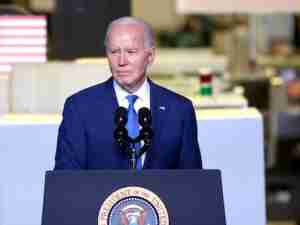The pound fell after a face-to-face meeting between European Union and British leaders failed to yield a Brexit trade breakthrough, with the two sides agreeing to keep talking until Sunday.
The currency dropped over 1% against both the dollar and euro as traders looked to yet another cut-off date for a deal, and as officials with knowledge of the discussions said negotiations are on course to end without one barring a dramatic last-minute intervention. Money markets brought forward expectations for a Bank of England rate cut, betting on a move to 0% in November.
Options traders are bracing for turbulence around Sunday, the latest marker set by British Prime Minister Boris Johnson and European Commission President Ursula von der Leyen, especially given that liquidity typically tapers off during December. The spread between one-week and two-week implied volatility is at the widest in a year.
“I still expect a deal even after this latest can kicking, but no doubt about it: the morning session will see even more no deal hedging type flows,” said Jordan Rochester, currency strategist at Nomura International Plc. “Neither the economics or the politics make sense to push for no deal at this stage. But we have to hope for the best, and prepare for the worst.”
With only weeks remaining to reach an accord, many traders had pinned their hopes on the face-to-face meeting this week after eight months of negotiations had reached an impasse. If a trade agreement isn’t struck by the end of year, the U.K. could face tariffs on exports to the bloc among several other damaging disruptions. The economy would suffer a near-term shock of around 1.5% of output, according to Bloomberg Economics.
Without a deal, British firms would revert to trading with the EU under rules established by the World Trade Organization in 1995. That means imports and exports to the EU would be subject to WTO-negotiated tariffs—essentially a tax on goods. Such a scenario could push the Bank of England to cut interest rates below zero for the first time ever, BofA Global Research said earlier this year.
Sterling declined as much as 1.1% to $1.3246, and the euro climbed as much as 1.2% to 91.26 pence as of 12:29 p.m in London. U.K. government bonds outperformed peers, with the yield on 10-year gilts declining as much as six basis points to 0.20%, the lowest in more than a month.
“Should the U.K. end up with a no deal Brexit, then we can expect the probability of negative interest rates to accelerate once again,” said Jeremy Stretch, head of G-10 currency research at Canadian Imperial Bank of Commerce in London. “We’re not pricing no deal yet, but the odds are increasingly moving in that direction.”








